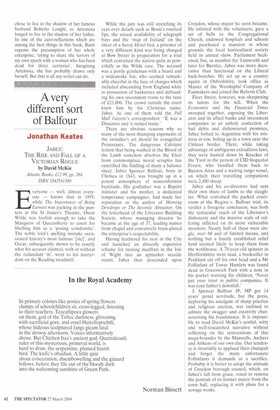Avery different sort of Balfour
Jonathan Keates
JABEZ : THE RISE AND FALL OF A VICTORIAN ROGUE by David McKie Atlantic Books, £12.99, pp. 284, ISBN 1843541300 Fv ery one — well, almost everyone — knows that in 1895, while The Importance of Being ii Earnest was packing in the punte rs at the St James's Theatre, Oscar Wilde was foolish enough to take the Marquess of Queensberry to court for libelling him as a 'posing somdomite'. The noble lord's spelling mistake occasioned history's most famous '[sic]', and Oscar, subsequently shown to be exactly what his accuser claimed, with or without the redundant 'm', went to his martyrdom on the Reading treadmill. While the jury was still stretching its eyes over details such as Bosie's roseleaf lips, the sexual availability of telegraph boys and the 'map of Ireland' on the sheet of a Savoy Hotel bed, a prisoner of a very different kind was being charged at Bow Street in preparation for a trial which convulsed the nation quite as powerfully as the Wilde case. The accused was a portly gentleman with a beard and a wideawake hat, who seemed remarkably cheerful in the face of charges which included absconding from England while in possession of banknotes and defrauding his own investment trusts to the tune of £21,000. The crowd outside the court knew him by his Christian name, Jabez. As one of them told the Pall Mall Gazette's correspondent "E was a Dissenter and 'e ruined many.'
There are obvious reasons why so many of the most thumping exponents of the swindler's art should be evangelical Protestants. The dangerous Calvinist notion that being washed in the Blood of the Lamb somehow absolves the Elect from commonplace moral scruples has sanctified the fiddling of many a balance sheet. Jabez Spencer Balfour, born in Chelsea in 1843, was brought up in a potent atmosphere of nonconformist beatitude. His godfather was a Baptist minister and his mother, a dedicated temperance campaigner, had made her reputation as the author of Morning Dewdrops or The Juvenile Abstainer. On the letterhead of the Liberator Building Society, whose managing director he became at the age of 37, leading names from chapel and conventicle brass-plated the enterprise's respectability.
Having feathered his nest in the City and launched an absurdly expensive scheme for turning mudflats in the Isle of Wight into an upmarket seaside resort, Jabez then descended upon Croydon, whose mayor he soon became. He enlisted with the volunteers, gave a set of bells to the Congregational Church, endowed hospitals and schools and purchased a mansion in whose grounds the local horticultural society held its annual show. Parliament beckoned, but, as member for Tamworth and later for Burnley. Jabez was more decorative than functional on the Liberal back-benches. He set up as a country squire in Oxfordshire, took office as Master of the Worshipful Company of Fanmakers and joined the Reform Club.
Fleet Street, however, was sharpening its talons for the kill. When the Economist and the Financial Times swooped together, exposing the Liberator and its allied banks and investment companies as an unholy confection of bad debts and dishonoured promises, Jabez bolted to Argentina with his mistress in tow, holing up in a town near the Chilean border. There, while taking advantage of ambiguous extradition laws, they were hunted down by Knacker of the Yard in the person of CID Inspector Froest, who bundled them back to Buenos Aires and a waiting cargo vessel, on which their travelling companions were 2,400 sheep.
Jabez and his co-directors had sent their own share of lambs to the slaughter. What convulsed the packed courtroom at the Regina v. Balfour trial, its verdict a foregone conclusion, was both the tentacular reach of the Liberator's dishonesty and the massive scale of suffering inflicted on its more vulnerable investors. Nearly half of these were single, over 60 and of limited means, and nothing but a hastily established relief fund seemed likely to keep them from the workhouse. A 70-year-old spinster in Hertfordshire went mad, a bookseller in Peckham cut off his own head and a Mr Follinfant of Tower Hamlets was found dead in Greenwich Park with a note in his pocket warning his children, 'Never put your trust in public companies. It was your father's downfall.'
J. Spencer Balfour JP, MP got 14 years' penal servitude, but the press, deploring his amalgam of sharp practice and religious unction, was inclined to admire the swagger and creativity characterising his fraudulence. It is impossible to read David McKie's zestful, witty and well-researched narrative without reflecting on the reinventions of this mega-bounder by the Maxwells, Archers and Aitkens of our own day. Our tendency is invariably to applaud their chutzpah and forget the many unfortunate Follinfants it demands as a sacrifice. Probably it is better to adopt the attitude of Croydon borough council, which, on Jabez's fall from grace, voted to remove the portrait of its former mayor from the town hall, replacing it with plans for a sewage works.


























































































 Previous page
Previous page